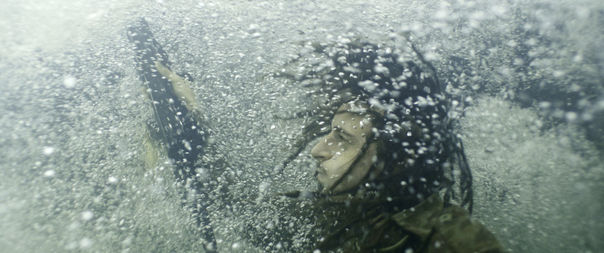Lord of the Flies Redux: Alejandro Landes’ MONOS
By Leonardo Goi

The teens at the centre of Alejandro Landes’ electrifying survivalist saga MONOS live in a foggy landscape suspended above the Colombian Andes. They go by aliases that echo childhood memories and action films (Smurf, Rambo, Bigfoot, Boom-Boom), though the weapons they bear are real, and their mission is no game. They are child soldiers recruited by a mysterious guerrilla group known as “The Organization,” stranded in a parentless and hyper-violent world that has abandoned them to their own fate.
MONOS, Colombian-Ecuadorian Landes’ third feature (following his 2011 PORFIRIO and 2007 documentary COCALERO) and shown in Berlinale Panorama, trails behind them as they plunge into a spiral of unspeakable violence. In a world where adult figures only appear for flickering moments, it zeroes in on a group of boys and girls as a synecdoche for humanity at large, to question the de-humanising character of war and its effect on a community untethered by rules and conventions. Its answer, on par with a novel it bears an overt allegiance to, William Golding’s “Lord of The Flies”, is a world where guerrilla warfare teems with sheer anarchy.
A dozen of barely teenage kids, the eponymous Monos spend their days patrolling the mountaintops of Northern Colombia, a cloud-shrouded landscape cinematographer Jasper Wolf renders via spell-binding vistas, working through widescreens that capture the Andes in all their belittling immensity. Tutored by a harsh older militant by the name of Mensajero (Wilson Salazar), they are killing machines tasked with looking after an American captive nicknamed Doctora (Julianne Nicholson) and a milk cow by the sobriquet of Shakira. But even Mensajero only shows up sporadically, and the grown-ups from The Organization remain distant presences, their muffled voices croaking from a radio and walkie-talkies. Left to their own devices, the stunted adolescents seesaw between training sessions that echo the raw physicality of Claire Denis’s BEAU TRAVAIL – bodies grinding against one another in topless war dances – and more intimate exchanges, where the unforgiving environment makes room for sporadic intramural effusions.
A curious gender fluidity permeates the community; part of the pleasure in watching MONOS is to see the kids inhabit a post-apocalyptic world were gender roles seem to have relinquished – if only momentarily – their sway. “Here’s to my father who called me a whore,” shouts Perro (Paul Cubides), wielding an assault rifle while sporting a mini-skirt and stockings. It is not the only instance of cross dressing, nor the only moment when same-sex tensions within the group become explicit. But if MONOS’ preamble seems to conjure a post-binary utopia, as the group eventually leaves the mountains to settle in the Colombian jungle, breaking down in the face of a fratricidal conflict, the gender syncretism falls apart too.
Wars do not quite simply claim lives, they also fashion subjectivities that are necessary for their continuation. What MONOS so accurately understands is that a conflict as long and complex as the one Colombia just ended with the FARC guerrillas – for which Landes’ work serves as an allegory – pivoted on the construction of hyper-violent and heteronormative masculinities, which the Monos come to embody to a visceral, chilling extent.

